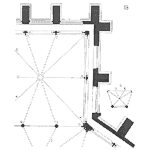
Life cycle costing (LCC) is a way of analysing equipment purchase choices. If the analysis is done right and all factors are addressed, and the information is good, you would select the item that cost the least amount to own (buy and use) over its working life. This piece of equipment when compared to other suitable items would perform its lifetime service at least total cost to the organisation. When buying equipment you want to know three things – purchase cost, running cost and maintenance cost. The total of these over the equipment’s life is its LCC. A low LCC means the least amount of money necessary was spent on it, while a high LCC means extra money was spent and that money was then not available for other things. From a purely financial viewpoint it is sensible to go for equipment with the lowest LCC possible. But it is not only the cost of a thing that needs to be considered when purchasing it.
As a simple example of the process we will choose a lawn mower. The options are a reel mower or a rotary mower. Start by developing a simple table like the one below listing the frequency and costs of the activities expected to occur through out its working life. The costs and frequency are the standard ones from the manufacturers and the parts and service people. Do not make them up. Take the recommendations of the manufacturers and service specialist so that the comparisons are based on fact and the opinion of knowledgeable persons.
- Purchase price
- Fuel for 10 years
- Service every
- Replace blades every Total cost for 10 years
10 yr. Cost $700
Reel 10 yr. Mower Cost 1 off $900 120 lt. $120 5 year $240 3 year $600
$1860
Rotary
Mower
1 off
120 lt. $120 3 year $240 1 year $500
$1560
The rotary mower has the best LCC being the cheapest to own. Does that mean people will not buy a reel mower? Off course not. People buy reel mowers because they leave a better cut on a lawn and are self-propelled. It is not always the cost that determines the selection, at times the functionality of the equipment is important.
Putting a value on functionality is difficult when compared to putting a value on a piece of machinery. Functionality is measured in job time savings, accidents not incurred, overtime not worked, people not having to be employed, etc. LCC falls short in that aspect of justifying equipment.
Mike Sondalini – Maintenance Engineer
If you found this interesting, you may like the ebook Bulk Materials Handling Introduction.
Leave a Reply